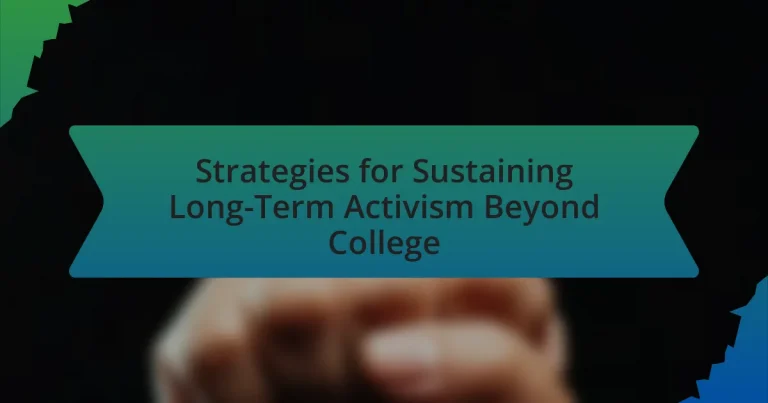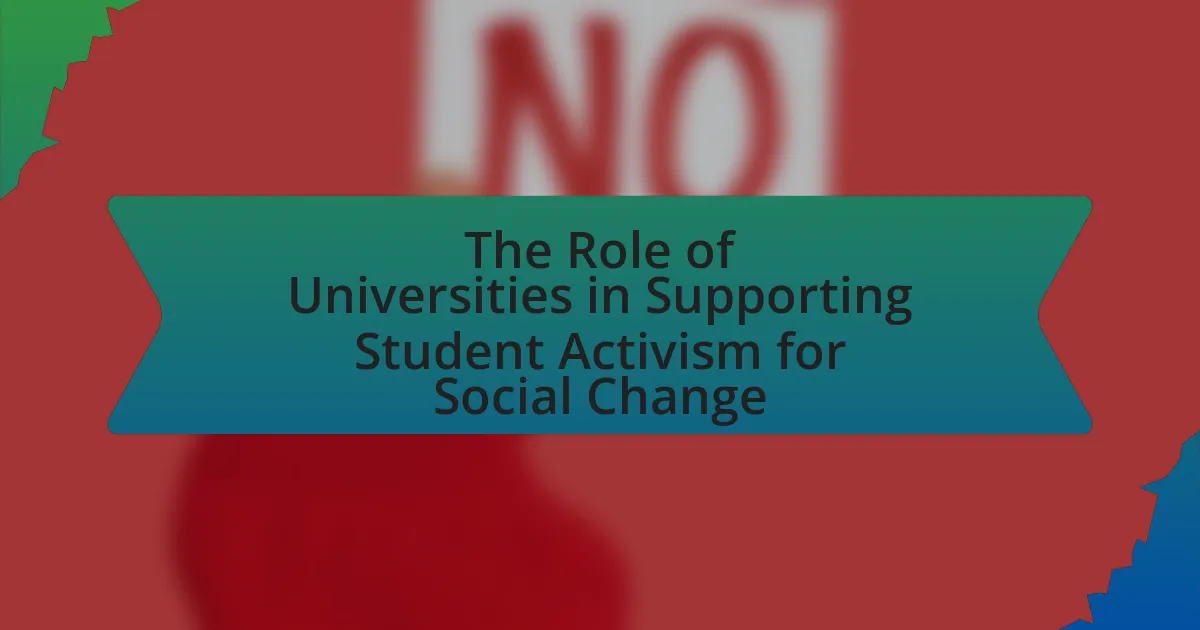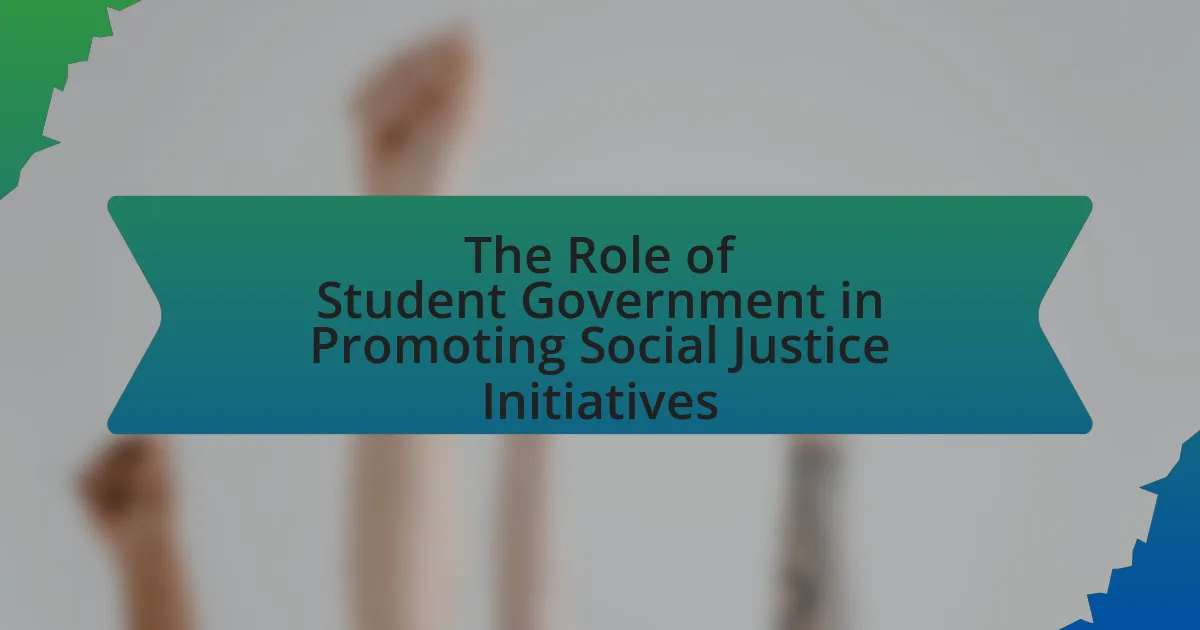The article focuses on strategies for sustaining long-term activism beyond college, emphasizing the importance of building a strong network, engaging in continuous education, and maintaining clear goals. It highlights how recent graduates can keep their passion for activism alive through community engagement and the role of alumni networks in providing support. The article also addresses the challenges activists face when transitioning to the workforce, the necessity of adapting strategies to evolving social landscapes, and the significance of digital tools and funding opportunities in enhancing activist efforts. Additionally, it discusses the benefits of mentorship and inclusivity within activist communities, providing practical tips for maintaining long-term commitment to social causes.
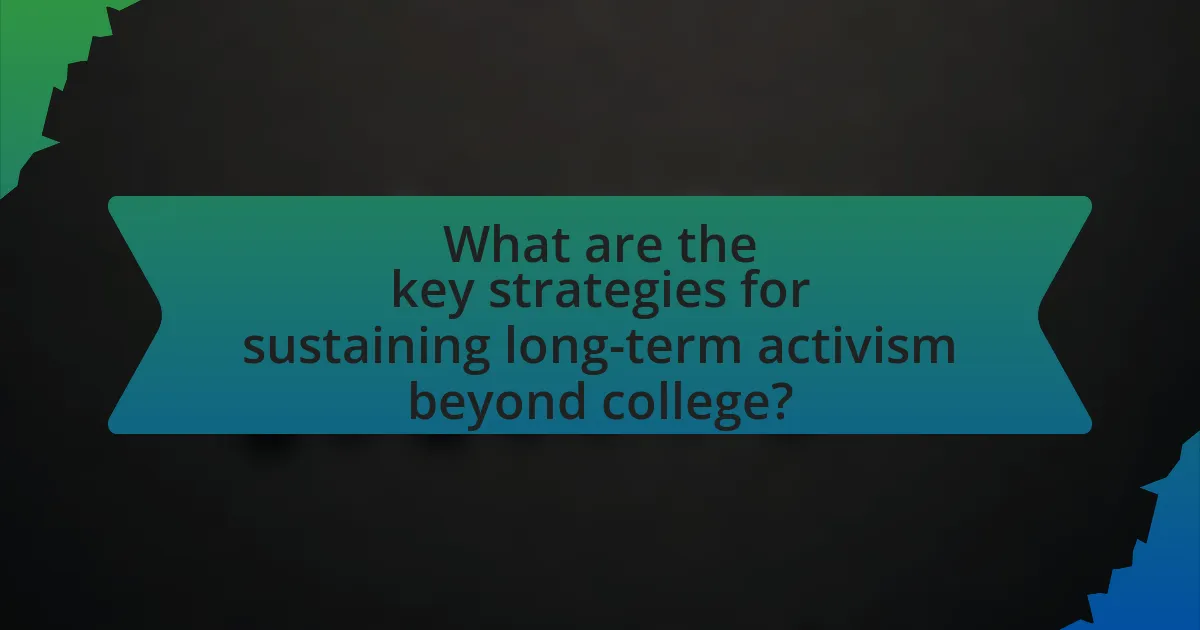
What are the key strategies for sustaining long-term activism beyond college?
Key strategies for sustaining long-term activism beyond college include building a strong network, engaging in continuous education, and maintaining a clear focus on specific goals. A strong network provides support and resources, as evidenced by studies showing that social connections enhance activism effectiveness. Continuous education, through workshops and seminars, keeps activists informed about current issues and strategies, which is crucial for adapting to changing circumstances. Lastly, maintaining a clear focus on specific goals helps in measuring progress and sustaining motivation, as successful movements often have defined objectives that guide their actions.
How can recent graduates maintain their passion for activism?
Recent graduates can maintain their passion for activism by actively engaging in community organizations and networks that align with their values. Participation in local advocacy groups provides a platform for collaboration, shared experiences, and ongoing education about pressing social issues. Research indicates that individuals who remain connected to like-minded communities are more likely to sustain their commitment to activism over time, as social support enhances motivation and resilience. For instance, a study published in the Journal of Community Psychology found that sustained involvement in community activism leads to increased civic engagement and a stronger sense of purpose among participants.
What role does community engagement play in sustaining activism?
Community engagement is essential for sustaining activism as it fosters a sense of belonging and collective purpose among individuals. When activists actively involve their communities, they create networks of support that enhance motivation and resilience. Research indicates that engaged communities are more likely to mobilize resources, share knowledge, and sustain efforts over time, leading to more effective and enduring activism. For example, studies show that grassroots movements with strong community ties can maintain momentum and adapt strategies in response to local needs, thereby increasing their impact and longevity.
How can alumni networks support ongoing activist efforts?
Alumni networks can support ongoing activist efforts by providing resources, mentorship, and a platform for collaboration among former students. These networks often have access to funding opportunities, which can be crucial for sustaining activist initiatives. For instance, alumni can organize fundraising events or connect activists with potential donors who share similar values. Additionally, alumni can offer mentorship, sharing their experiences and strategies that have proven effective in activism, thus enhancing the skills of current activists. Furthermore, alumni networks facilitate collaboration by connecting individuals with diverse expertise, allowing for a more comprehensive approach to activism. Research indicates that strong alumni engagement can lead to increased support for social causes, as seen in various case studies where alumni have mobilized resources for community projects.
Why is it important to adapt activism strategies after college?
Adapting activism strategies after college is crucial because the social, political, and economic landscapes evolve, requiring new approaches to effectively address ongoing issues. As graduates transition into the workforce, they encounter different environments and audiences, necessitating a shift in tactics to maintain engagement and impact. For instance, research indicates that 70% of young activists feel disconnected from traditional activism methods post-college, highlighting the need for innovative strategies that resonate with diverse communities and leverage digital platforms. This adaptability ensures that activism remains relevant and effective in driving social change.
What challenges do activists face when transitioning from college to the workforce?
Activists face several challenges when transitioning from college to the workforce, including a lack of financial stability, difficulty in finding jobs that align with their values, and the need to balance activism with professional responsibilities. Financial instability often arises as many activists may have limited work experience and may struggle to secure positions that offer adequate compensation. Additionally, finding employment in sectors that support social justice or environmental causes can be challenging, as many organizations may prioritize profit over activism. Lastly, the transition often requires activists to navigate the demands of a full-time job while maintaining their commitment to activism, which can lead to burnout and a sense of disconnection from their activist roots.
How can activists redefine their goals in a post-college environment?
Activists can redefine their goals in a post-college environment by focusing on community engagement, leveraging professional skills, and forming coalitions with like-minded organizations. This shift allows activists to adapt their strategies to the realities of their new environments, such as workplaces or local communities, where they can apply their knowledge and experience to address social issues effectively. For instance, a study by the Harvard Kennedy School found that individuals who engage in community-based initiatives post-college are more likely to sustain their activism and influence policy changes. By setting specific, measurable objectives that align with their new contexts, activists can maintain momentum and foster long-term impact.
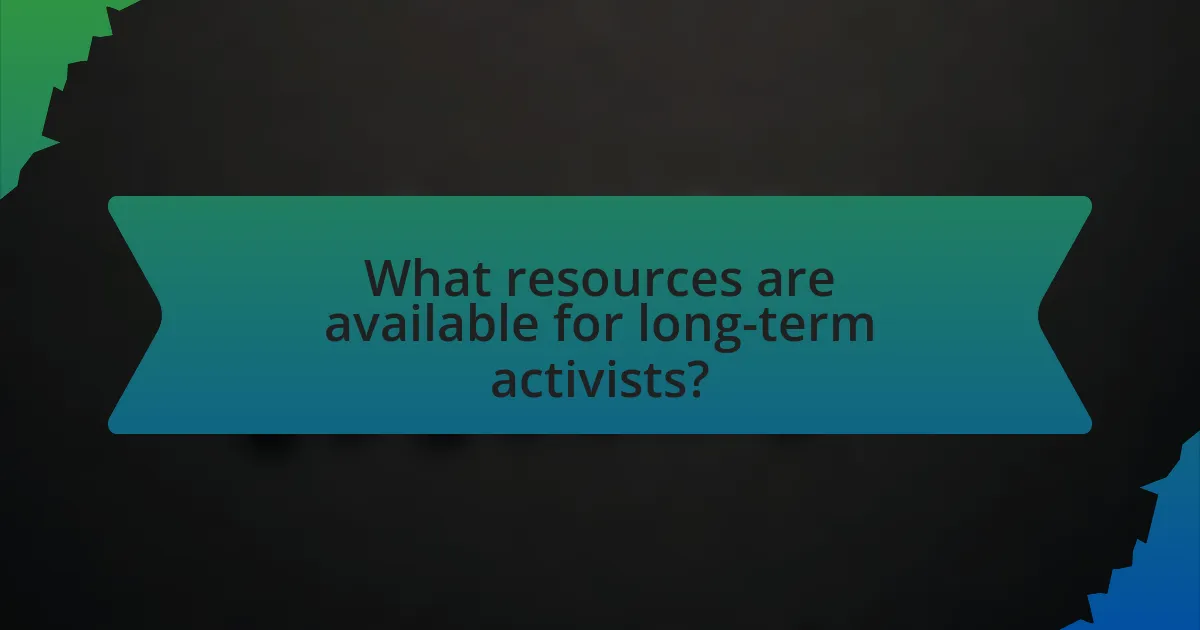
What resources are available for long-term activists?
Long-term activists can access various resources, including training programs, funding opportunities, and community networks. Organizations such as the Grassroots Institute for Fundraising Training offer workshops that enhance fundraising skills, while platforms like the Activist Fund provide grants specifically for grassroots initiatives. Additionally, networks such as the National Network of Abortion Funds connect activists with local resources and support systems, fostering collaboration and shared knowledge. These resources are essential for sustaining activism over time, as they equip individuals with the necessary skills, financial support, and community connections to continue their work effectively.
How can online platforms enhance activist efforts?
Online platforms can enhance activist efforts by providing a space for widespread communication, mobilization, and resource sharing. These platforms enable activists to reach larger audiences quickly, facilitating the dissemination of information and rallying support for causes. For instance, social media platforms like Twitter and Facebook have been instrumental in organizing protests and campaigns, as evidenced by the Arab Spring, where online communication played a crucial role in mobilizing thousands of individuals for social change. Additionally, online platforms allow for the creation of communities that can share strategies, tools, and experiences, thereby strengthening the overall impact of activism.
What are the most effective social media strategies for activists?
The most effective social media strategies for activists include creating engaging content, building a strong online community, and utilizing data analytics to measure impact. Engaging content, such as compelling visuals and storytelling, captures attention and encourages sharing, which is crucial for spreading awareness. Building a strong online community fosters support and collaboration among activists, enhancing collective action. Utilizing data analytics allows activists to track engagement metrics, understand audience preferences, and refine strategies for greater effectiveness. Research indicates that campaigns leveraging these strategies can increase participation and mobilization, as seen in movements like Black Lives Matter, which effectively used social media to amplify their message and organize protests.
How can digital tools facilitate collaboration among activists?
Digital tools facilitate collaboration among activists by providing platforms for communication, organization, and resource sharing. These tools, such as social media, messaging apps, and project management software, enable activists to connect in real-time, coordinate efforts, and mobilize support efficiently. For instance, social media platforms like Twitter and Facebook allow activists to disseminate information quickly and engage with a broader audience, while tools like Slack or Trello help manage tasks and projects collaboratively. Research indicates that digital communication can enhance group cohesion and increase participation rates, as seen in movements like the Arab Spring, where online platforms played a crucial role in organizing protests and spreading awareness.
What types of funding opportunities exist for activist projects?
Various funding opportunities exist for activist projects, including grants, crowdfunding, sponsorships, and partnerships with non-profit organizations. Grants are often provided by foundations and government entities specifically aimed at supporting social change initiatives; for example, the Ford Foundation offers grants for projects that promote social justice. Crowdfunding platforms like Kickstarter and GoFundMe allow activists to raise money directly from supporters, enabling grassroots funding. Sponsorships from businesses can provide financial support in exchange for brand visibility, while partnerships with non-profits can offer both funding and resources, leveraging their established networks and expertise. These funding avenues are crucial for sustaining long-term activism beyond college, as they provide the necessary financial backing to implement and maintain impactful projects.
How can activists successfully apply for grants and sponsorships?
Activists can successfully apply for grants and sponsorships by clearly defining their mission, demonstrating community impact, and presenting a well-structured proposal. A focused mission statement helps grantors understand the purpose of the activism, while evidence of community impact, such as statistics or testimonials, showcases the effectiveness of the initiatives. A well-structured proposal should include a detailed budget, specific goals, and a timeline for project implementation, which aligns with the expectations of funding organizations. According to the Foundation Center, organizations that provide grants often prioritize proposals that clearly articulate measurable outcomes and demonstrate sustainability, making these elements crucial for success in securing funding.
What role do crowdfunding platforms play in sustaining activism?
Crowdfunding platforms play a crucial role in sustaining activism by providing financial resources that empower activists to pursue their causes. These platforms enable individuals and organizations to raise funds directly from supporters, facilitating grassroots movements and initiatives that may lack traditional funding sources. For instance, campaigns on platforms like GoFundMe or Kickstarter have successfully funded social justice initiatives, environmental projects, and community programs, demonstrating the effectiveness of crowdfunding in mobilizing resources for activism. In 2020, a report indicated that crowdfunding for social causes increased by 30%, highlighting its growing importance in sustaining long-term activism.
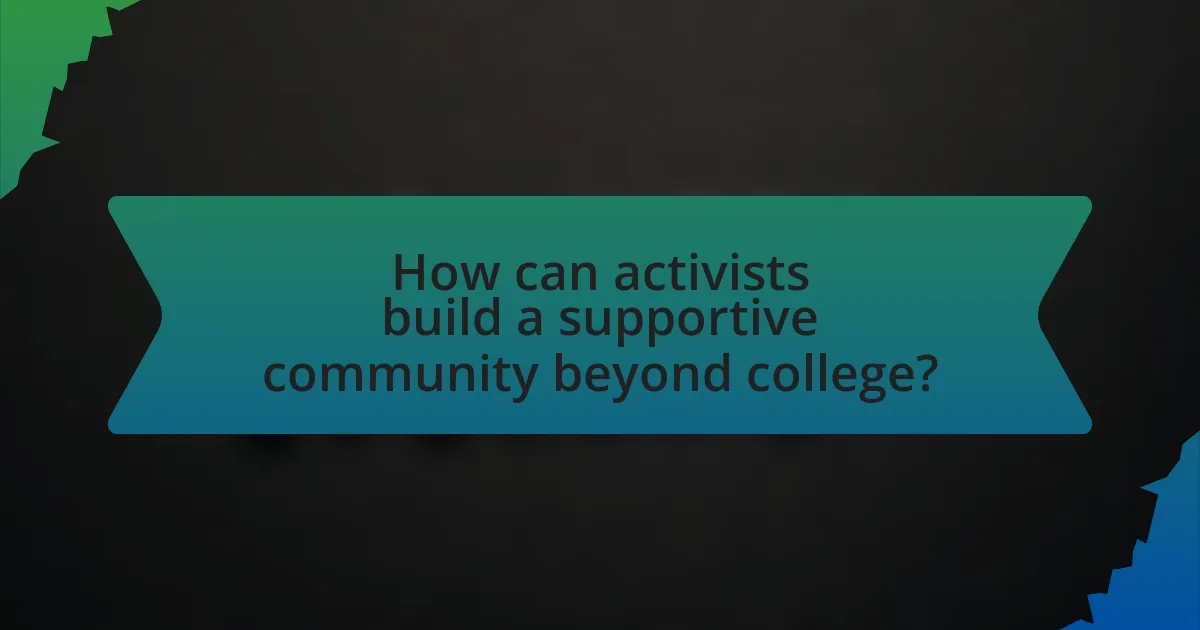
How can activists build a supportive community beyond college?
Activists can build a supportive community beyond college by leveraging social media platforms to connect with like-minded individuals and organizations. Utilizing platforms such as Facebook, Twitter, and Instagram allows activists to share resources, organize events, and foster discussions that extend their reach beyond campus. Research indicates that 69% of adults in the U.S. use social media, making it a powerful tool for community building. Additionally, participating in local community events and collaborating with established organizations can create networks that provide ongoing support and resources for activism. Engaging in volunteer opportunities and attending workshops can further enhance skills and connections, reinforcing the activist community outside of the college environment.
What are the benefits of joining or forming activist groups?
Joining or forming activist groups provides individuals with a platform for collective action, enhancing their ability to effect social change. These groups foster a sense of community and solidarity, which can amplify individual voices and increase the impact of advocacy efforts. Research indicates that collective action is often more effective than individual efforts; for instance, studies show that organized groups can mobilize resources, attract media attention, and influence public policy more successfully than isolated individuals. Additionally, being part of an activist group can offer members access to training, resources, and networks that enhance their skills and effectiveness in activism.
How can local organizations help sustain long-term activism?
Local organizations can sustain long-term activism by providing ongoing support, resources, and community engagement opportunities. They create networks that connect activists with like-minded individuals, fostering collaboration and shared goals. For instance, organizations like the Sierra Club have successfully mobilized grassroots efforts for environmental advocacy, demonstrating that sustained engagement leads to impactful change. Additionally, local organizations often offer training programs and workshops that equip activists with essential skills, ensuring they remain effective in their efforts over time. This structured support system is crucial for maintaining momentum and adapting to evolving social issues.
What strategies can be used to foster inclusivity within activist communities?
To foster inclusivity within activist communities, implementing diverse leadership structures is essential. Diverse leadership ensures representation from various backgrounds, which can enhance decision-making and broaden perspectives. Research indicates that organizations with diverse leadership are more innovative and effective in addressing complex social issues. Additionally, creating safe spaces for dialogue allows members to share their experiences and challenges, fostering understanding and solidarity. Regular training on cultural competency and anti-oppression practices can further equip members to engage inclusively. These strategies collectively contribute to a more equitable and effective activist community.
How can mentorship enhance the effectiveness of long-term activism?
Mentorship enhances the effectiveness of long-term activism by providing guidance, support, and knowledge transfer from experienced activists to newcomers. This relationship fosters skill development, strategic thinking, and resilience, which are crucial for sustaining activism over time. Research indicates that mentorship can lead to increased engagement and retention in activist movements, as evidenced by a study published in the Journal of Community Psychology, which found that mentored individuals reported higher levels of commitment and effectiveness in their activism efforts.
What qualities should activists look for in a mentor?
Activists should look for mentors who possess experience, empathy, and a strong network. Experience ensures that the mentor has practical knowledge and insights into the challenges of activism, which can guide activists in navigating their paths effectively. Empathy allows the mentor to understand the emotional and personal struggles that activists face, fostering a supportive environment. A strong network provides access to resources, connections, and opportunities that can enhance the activist’s efforts. Research indicates that mentorship significantly impacts the success and retention of activists in their pursuits, highlighting the importance of these qualities in fostering long-term engagement in activism.
How can experienced activists guide newcomers in their journey?
Experienced activists can guide newcomers by providing mentorship, sharing resources, and facilitating connections within the activist community. Mentorship allows newcomers to learn from the experiences of seasoned activists, helping them navigate challenges and avoid common pitfalls. Sharing resources, such as literature, toolkits, and training opportunities, equips newcomers with the knowledge and skills necessary for effective activism. Additionally, facilitating connections with other activists and organizations fosters a supportive network, enhancing collaboration and engagement. Research indicates that mentorship in activism significantly increases retention and effectiveness, as seen in studies conducted by the National Conference on Citizenship, which highlight the importance of community support in sustaining long-term engagement.
What practical tips can help sustain long-term activism beyond college?
To sustain long-term activism beyond college, individuals should establish a strong network of like-minded activists and organizations. Building connections with others who share similar goals enhances collaboration and support, which is crucial for maintaining motivation and momentum. Research indicates that social networks significantly influence sustained engagement in activism, as seen in studies by the Stanford Social Innovation Review, which highlight the importance of community in fostering long-term commitment to social causes. Additionally, setting clear, achievable goals and regularly assessing progress can help activists stay focused and motivated over time.
